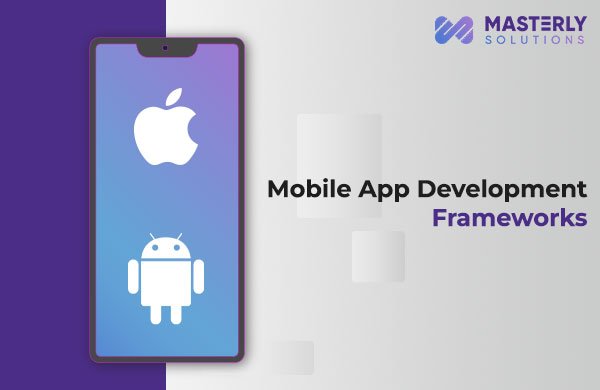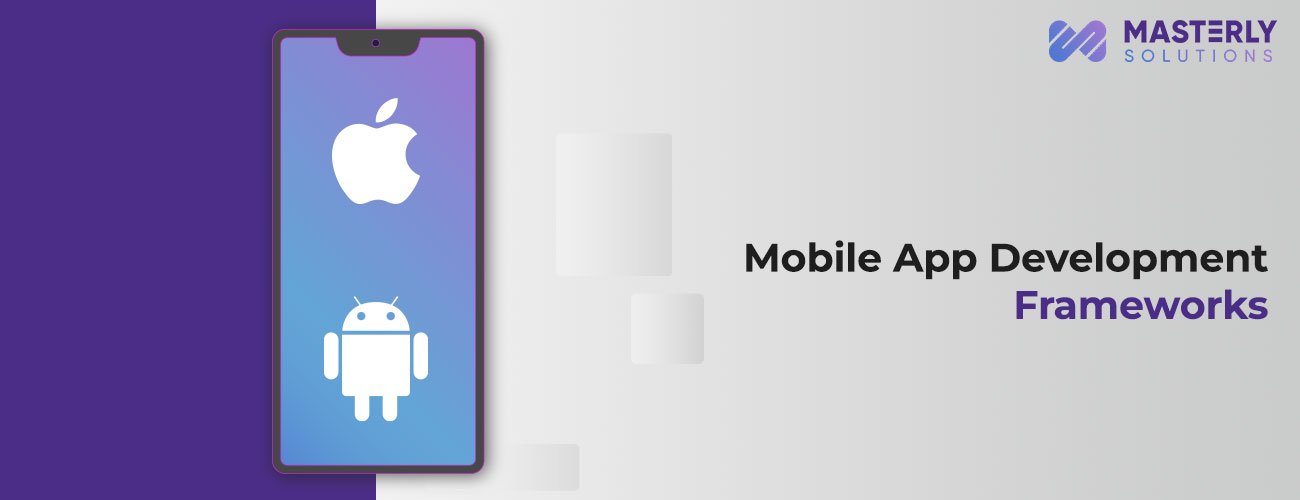
Overview:
As the demand for mobile apps continues to grow, so too does the need for a reliable and secure mobile app development frameworks.
Mobile app development has become a crucial aspect of the digital world, enabling businesses and individuals to reach a vast audience and provide engaging experiences.
To simplify the app development process and enhance efficiency, developers rely on mobile app development frameworks. These frameworks offer a set of tools, libraries and pre-build components that facilitate the creation of mobile applications across multiple platforms.
In 2023, several leading frameworks have emerged as popular choices among developers, each with its own unique features and advantages. These frameworks will also need to support cross-platform development for both Android and iOS devices.
Additionally, all the software development company should provide access to cloud services as well as support for advanced technologies such as artificial intelligence and machine learning.
This way, developers can create innovative apps that stand out from the competition.
What exactly are Mobile App Development Frameworks?
Mobile applications development frameworks are software platforms that provide developers with the necessary tools, libraries and APIs to build mobile applications for different operating systems, such as iOS and Android.
These frameworks offer a unified development environment and allow developers to write code once and deploy it across multiple platforms, saving time and effort.
In today’s era, leading mobile app development frameworks will be focused on providing an efficient and cost-effective way to build high-quality apps.
These frameworks will offer features that make it easier for developers to create powerful applications quickly and easily.
Let’s have a look at some of the most widely used mobile app development frameworks.
Leading Mobile App Development Frameworks in 2023:
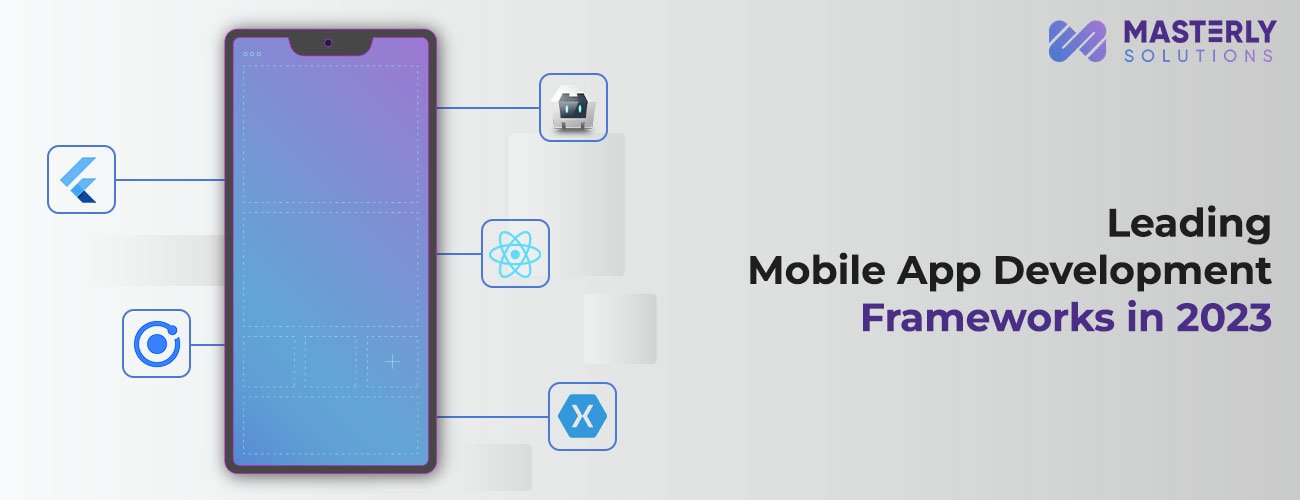
The leading mobile app development frameworks in 2023 will have cutting-edge technology such as Artificial Intelligence (AI), Machine Learning (ML), Augmented Reality (AR), Virtual Reality (VR), Natural Language Processing (NLP) and much more.
These technologies will enable developers to create apps with powerful functionalities that can cater to the needs of users in the future.
Let us delve deeper into the most recent mobile application frameworks that have made their presence heard in 2023.
1. Flutter:
Flutter, developed by Google, has gained significant popularity among mobile app developers due to its cross-platform capabilities and exceptional performance.
It utilizes a single codebase written in Dart, enabling developers to create high-quality apps for iOS, Android, and even the web.
Features of Flutter:
1. Hot Reload: Flutter’s hot reload feature allows developers to see changes in real-time, making the development process faster and more efficient.
2. Widgets: Flutter includes a plethora of customisable widgets that allow developers to create visually beautiful and responsive user interfaces.
3. Access to Native Features: Accessibility to native features such as cameras, GPS, and contacts.
4. Rapid Deployment Cycle: The flexibility to use a single codebase across both Android and iOS platforms saves development teams time and effort.
5. Performance: Flutter’s architecture and rendering engine contribute to its exceptional performance, resulting in smooth animations and fast app startup times.
Examples of apps built using Flutter:
- Google Ads
- Reflectly
- Hamilton Musical App
- Google Pay
- Cryptograph
When should you use Flutter?
Flutter is an excellent choice when you want to create a visually stunning and performant app that runs smoothly on multiple platforms.
It is ideal for startups, MVP development, and projects with strict timelines.
2. React Native:
React Native, developed by Facebook (Now Meta), is another widely adopted framework known for its ability to build native-like mobile applications using JavaScript.
It allows developers to reuse code across platforms, resulting in significant time savings and a consistent user experience. It has a large development community and numerous libraries.
Features of React Native:
1. Cross-platform Development: React Native enables developers to write code once and deploy it on both iOS and Android platforms, reducing development time and effort.
2. Native Components: It provides access to a wide range of pre-built UI components, allowing developers to create native-like interfaces easily.
3. Third-Party Libraries: React Native has a vast ecosystem of third-party libraries and plugins, providing additional functionalities and flexibility.
4. Live Reload: The live reload tool provides two screens: one for editing the code and another for viewing the changes. Anyone with expertise in mobile application development understands how important this capability is.
Examples of apps built using React Native:
- Flipkart
- Shopify
- Skype
- Amazon Prime
- Tesla
When should you use React Native?
React Native is an excellent choice for projects that require a native-like user experience, access to device APIs, and efficient development cycles. It is suitable for applications that demand frequent updates and have moderate complexity.
3. Xamarin:
Xamarin, owned by Microsoft, is a powerful and one of the best frameworks for developing cross-platform mobile applications using C#.
It allows developers to share code across different platforms while providing a native-like user experience. It offers a development ecosystem that includes components, a back end, APIs, and more.
Xamarin integrates native platform features to reuse 90% of the app’s code across platforms while maintaining native performance, look, and feel.
Features of Xamarin:
1. Native Performance: Xamarin applications provide native performance as they leverage platform-specific APIs and components.
2. Code Sharing: Developers can share a significant portion of their codebase across platforms, resulting in reduced development time and effort.
3. Microsoft Integration: Xamarin seamlessly integrates with Microsoft development tools and services, making it an attractive choice for enterprises.
Examples of apps built using Xamarin:
- The World Bank
- Alaska Airlines
- Olo
- Microsoft News App
- UPS mobile app
- Tube Mate
When should you use Xamarin?
Xamarin is ideal for enterprises and organizations that heavily rely on Microsoft technologies. It is well-suited for complex projects that require native performance, platform-specific integrations, and extensive code sharing.
4. Apache Cordova:
Apache Cordova, also known as PhoneGap, is an open-source framework that allows developers to build hybrid mobile applications using HTML, CSS, and JavaScript.
It provides a bridge between web technologies and native device functionalities.
Features of Apache Cordova:
1. Cross-platform Development: Cordova enables developers to create apps that can run on multiple platforms, including iOS, Android, and Windows Phone.
2 Access to Native APIs: Developers can access native device functionalities, such as camera and geolocation, using JavaScript APIs provided by Cordova.
3. Extensive Plugin Ecosystem: Cordova has a vast plugin ecosystem that allows developers to extend the capabilities of their applications.
4. Command-Line Interface (CLI): Apache Cordova provides a command-line interface (CLI) tool that allows developers to create, build, and manage Cordova projects. The CLI provides a set of commands to perform various tasks, such as creating new projects, adding or removing platforms, building the app, running it on emulators or devices, and more.
It simplifies the development process by automating common tasks and providing a consistent workflow across different platforms.
5. Capabilities and support for offline usage: One of the key features of Cordova is its ability to access native device capabilities through a set of JavaScript APIs. These APIs, known as plugins, allow developers to access device features like the camera, accelerometer, contacts, file system, geolocation, and more. With these capabilities, developers can create offline-capable applications that can interact with the device hardware and use local storage to store data.
6. Ability to provide a Cloud solution: While Cordova itself does not provide a built-in cloud solution, it offers the flexibility to integrate with cloud services and APIs. Cordova applications can communicate with remote servers using standard web technologies like RESTful APIs or WebSocket connections.
This enables developers to build applications that leverage cloud services for various purposes such as data storage, user authentication, real-time updates, push notifications, and more.
Examples of apps built using Apache Cordova:
- Untappd
- Wikipedia
- HealthTap
When should you use Apache Cordova?
Cordova is suitable for projects that prioritize development speed and cost-effectiveness. It is an excellent choice for building simple to moderately complex apps that rely heavily on web technologies.
5. Ionic:
Ionic is a popular open-source framework that leverages web technologies, including HTML, CSS, and JavaScript, to build cross-platform mobile applications.
It provides a library of pre-built UI components and tools for efficient app development. Ionic provides a plethora of UI components and plugins, making app development and deployment faster and easier.
Ionic enables the application designer to make use of UI features such as forms, filters, views, action sheets, tab bars, and navigation menus to make creative and user-friendly application.
Features of Ionic:
1. UI Components: Ionic offers a rich set of pre-built UI components that are optimized for mobile interfaces, resulting in visually appealing and consistent app designs.
2. Cordova Integration: Ionic seamlessly integrates with Apache Cordova, enabling access to native device features through plugins.
3. Progressive Web Apps: Ionic supports the creation of Progressive Web Apps (PWAs), allowing developers to build web applications that can be installed on mobile devices.
Examples of apps built using Ionic:
- MarketWatch
- Sworkit
- JustWatch
- T-Mobile
- Instant Pot
- Firstly
When should you use Ionic?
Ionic is an excellent choice for projects that prioritize a visually appealing and interactive user interface. It is suitable for building hybrid apps and Progressive Web Apps, especially for startups and projects with limited resources.
Ideally, choosing the right mobile app development framework depends on various factors, including project requirements, target audience, development speed, and available resources.
Let’s move further with the pros of mobile app development frameworks..
The Pros of Mobile App Development Frameworks:
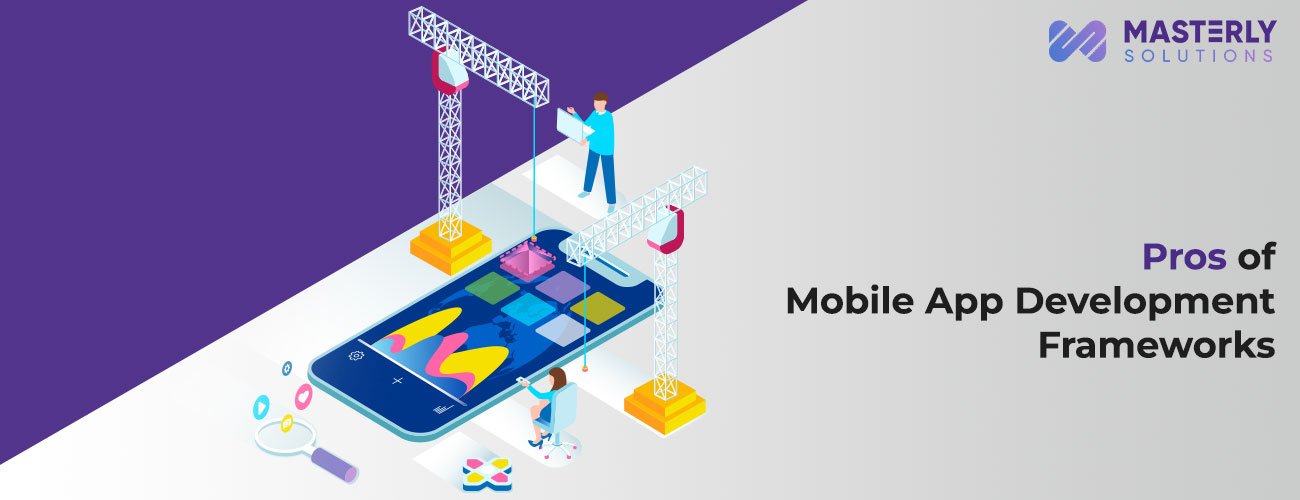
1. Faster Development:
Mobile app development frameworks provide tools and pre-built components that speed up the development process, allowing developers to deliver apps quickly.
2. Code Reusability:
Frameworks like Flutter, React Native, and Xamarin enable developers to write code once and deploy it across multiple platforms, reducing development time and effort.
3. Cross-Platform Capabilities:
With the ability to create apps for multiple platforms, developers can reach a broader audience and maximize their app’s potential.
4. Access to Native Features:
Many frameworks offer seamless integration with native APIs, allowing developers to leverage the device’s capabilities and deliver a native-like user experience.
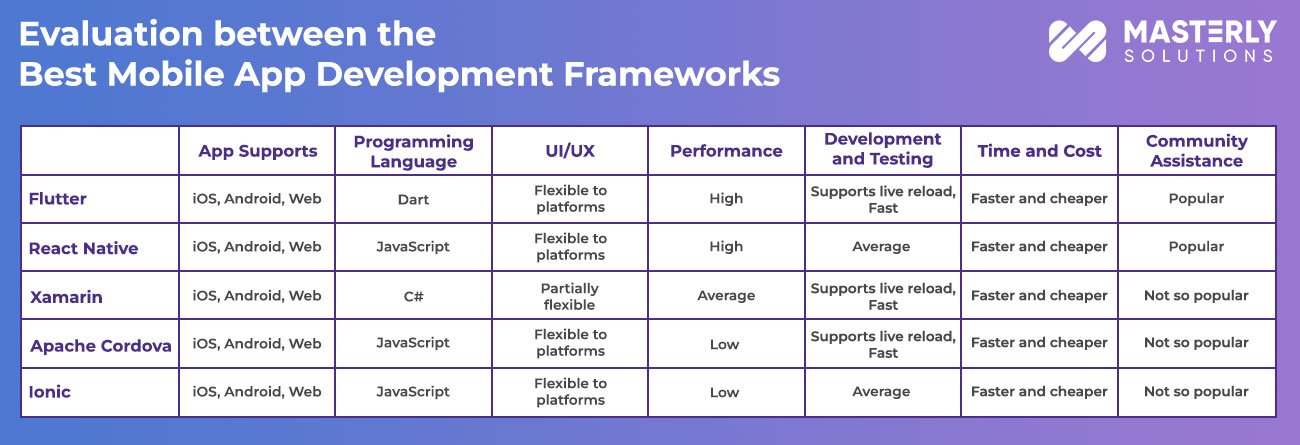
How Masterly Solutions Sets the Bar High in Mobile App Development Partnerships:
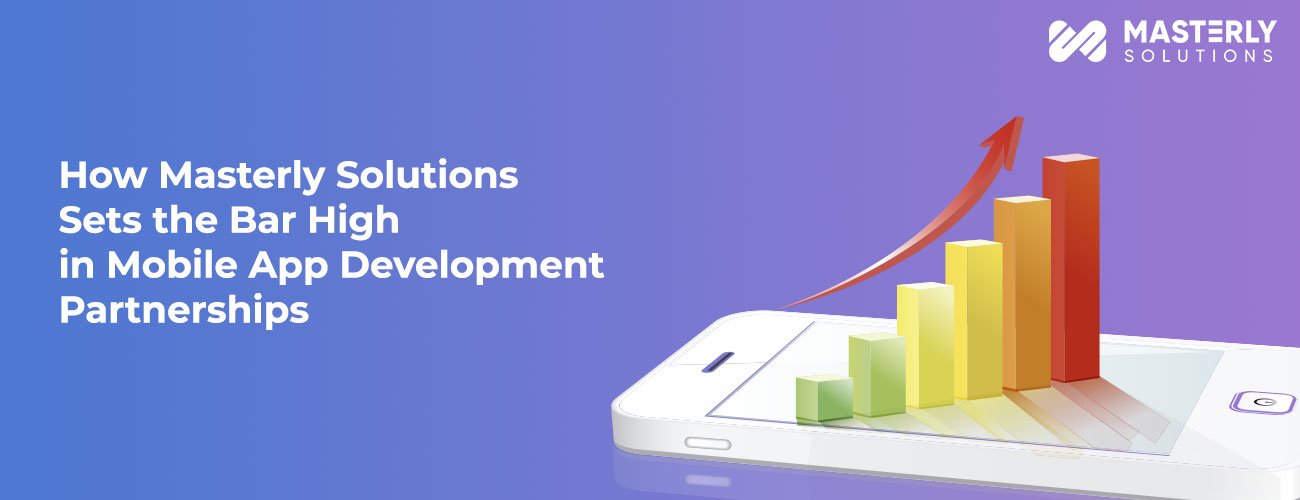
At Masterly Solutions, we understand the significance of mobile applications in today’s digital landscape.
A well-designed and user-friendly mobile app can be a game-changer for businesses, enabling them to connect with their customers on a whole new level. We take pride in being a leading provider of mobile app development services, and here are some compelling reasons why partnering with Masterly Solutions is the right choice for your mobile app development needs.
Expertise and Experience:
With years of experience in the industry, our team of talented developers has honed their skills to deliver exceptional mobile app solutions. We have successfully completed numerous projects for clients across various industries, ranging from startups to large enterprises.
Our expertise spans across iOS, Android, and cross-platform app development, ensuring that we can cater to your specific requirements regardless of the platform.
User-Centric Design:
User experience is paramount when it comes to mobile app success. A well-designed app not only captivates users but also enhances their engagement and loyalty.
Our designers specialize in creating intuitive, visually appealing, and user-friendly interfaces. We focus on understanding the behavior and preferences of your target audience, ensuring that every element of the app is optimized for a delightful user experience.
By prioritizing usability and aesthetics, we create apps that users love to interact with.
Customized Solution:
We understand that each business is unique, and cookie-cutter solutions don’t always fit the bill. That’s why we take a personalized approach to mobile app development.
Our team collaborates closely with you to understand your business goals, target audience, and specific needs. We then craft a customized solution that aligns perfectly with your brand identity and objectives.
By tailoring the app to your requirements, we ensure that it stands out in a crowded marketplace and provides a seamless user experience.
Agile Development Process:
We follow an agile development methodology to ensure efficient and timely project delivery. Our iterative approach allows us to adapt to changing requirements, incorporate feedback, and deliver incremental updates throughout the development process.
Our goal is to provide you with a seamless development experience, enabling you to launch your app in the market quickly and efficiently.
Quality Assurance:
At Masterly Solutions, our dedicated quality assurance team conducts comprehensive testing across multiple devices, platforms, and scenarios to ensure that your app performs flawlessly and provides a consistent experience to your users.
Post-Launch Support:
Our partnership doesn’t end with the app launch. We offer ongoing support and maintenance to guarantee that your app is always up to date, secure, and performing optimally.
We believe in building long-term relationships with our clients, and our post-launch support reflects our dedication to your app’s long-term success.
Partnering with us for mobile app development means gaining a trusted ally who is committed to delivering excellence.
Case Study:
We have a diverse group of individuals with backgrounds in technology, business strategy, and creative thinking. From the outset, we made it our mission to place our clients at the center of everything we do. We think that their success is a reflection of our own.
By forging strong partnerships and truly understanding their unique needs, we have been able to deliver tailored solutions that drive tangible results.
Hospitality:
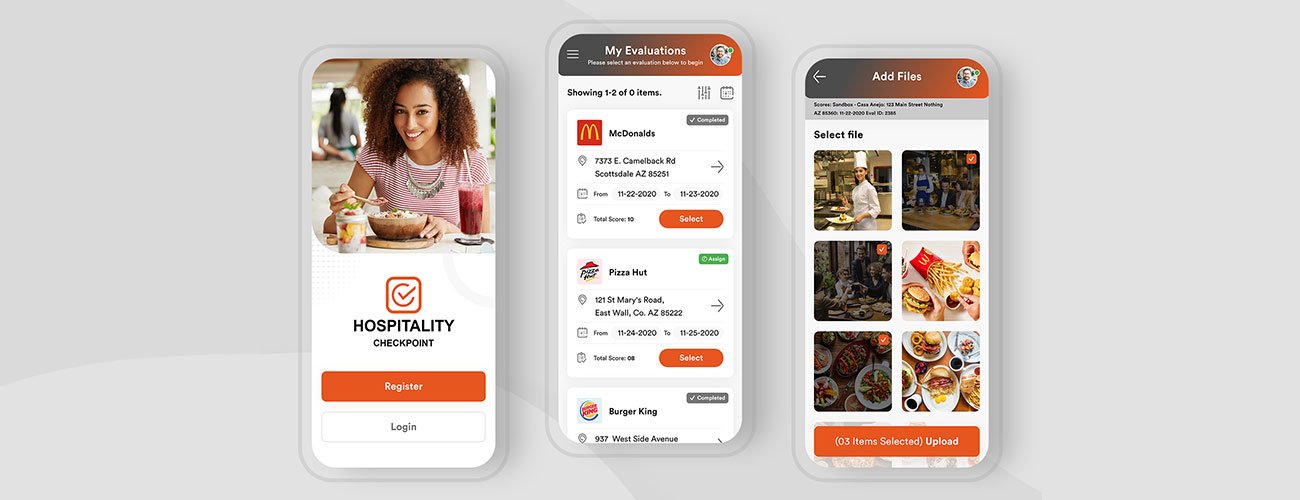
TimeWatch:
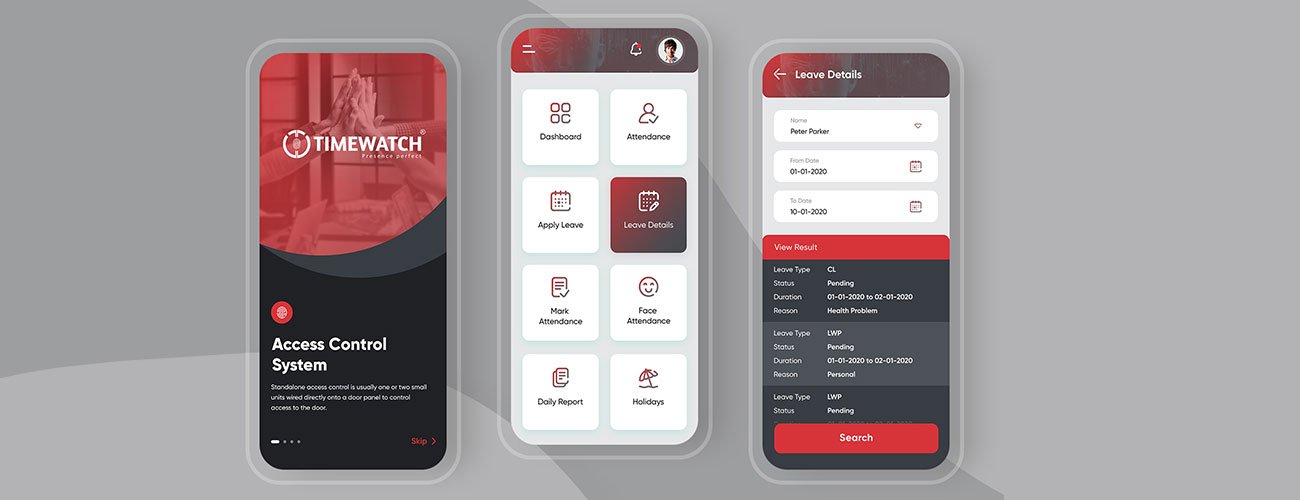
In a Nutshell:
In 2023, mobile app development frameworks play a crucial role in simplifying and accelerating the app development process.
By evaluating project requirements and considering crucial factors developers can choose the framework that best suits their needs and delivers exceptional mobile applications in a cost-effective manner.
Contact us today and partner to enhance the success of mobile app development projects.
